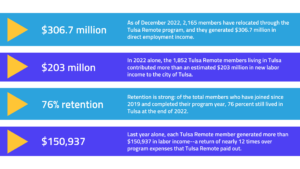This Guest Article for REVITALIZATION was written by Justin Harlan.
In recent months, there has been a surge of discussion surrounding the future of work, with leaders speaking out against remote work and companies like Meta and Google placing new emphasis on return-to-office mandates. However, amidst the debate, little attention has been given to remote work’s concrete economic benefits.
As the Managing Director of Tulsa Remote, the pioneering remote work incentive program and the world’s largest community of remote workers, I’m pleased to tell you about our first Economic Impact Report.
The report provides a comprehensive look at how remote work has positively affected the Tulsa community since we began in 2018 and why we advocate for remote work to play a significant role in the future of work.
I believe the data we’ve found offers encouragement and lessons for other small and medium-sized cities looking to create similar programs and diversify their own local economies.
The United States economy stands to gain immense benefits from remote work, particularly in bridging the deep divides between coastal and heartland areas. Many local economies face challenges when it comes to talent recruitment, and the “brain drain” phenomenon from small and mid-sized cities has been a growing concern.
A recent Brookings Institution report highlights that remote worker attraction programs, such as Tulsa Remote, have the potential to reverse this trend and position more regions of the country for success. We’ve certainly seen this prove to be true.
The Tulsa Remote program launched in 2018 to invite the expanding number of remote workers nationwide to relocate to Tulsa for at least one year.
The city of Tulsa, Oklahoma offers residents access to amenities like the Gathering Place: an incredible 100-acre park, access to the Tulsa Arts District and vibrant downtown area, a thriving live music scene, international cuisine offerings, and a host of annual community festivals and celebrations.
Our program’s creators had a lightbulb moment, knowing that the city of Tulsa was the perfect place to invite talent from across the country.
Tulsa Remote was launched on the idea that if we could break down the barriers individuals face when considering a move, and people were able to experience Tulsa, have access to a support system of like-minded remote workers upon arrival, and receive financial support to give the city a try, they would want to stay and call Tulsa home.
Fast forward five years and over 2500 participants later, our findings demonstrate the success of this idea and the significant impact our program has made on the local economy.
One of the key indicators of success is that Tulsa Remote participants have become “magnet movers,” attracting their friends and family to move to the city without the incentive and then start or continue their own careers or businesses.
Consider Obum Ukabum, one of the first Tulsa Remote participants. He and his wife, Faith Walker, who was not a Tulsa Remote member, moved here from Southern California in 2019. She recently opened her own restaurant and has employed 17 local Tulsans. Obum and Faith are a perfect example of how this ripple effect creates benefits for Tulsa and its residents that extend beyond financial gains.
We know that our program’s impact on Tulsa is far greater than the initial investment. It has brought in skilled workers, generated local jobs, increased tax rolls, and infused more energy into the city’s vibrant cultural and recreational life.
Tulsa’s traditional economy has been dominated by oil and gas extraction and aerospace manufacturing, industries not conducive to remote work. By contrast, Tulsa Remote participants generally work in the knowledge economy as managers and program directors, financial professionals, marketers, consultants, and software developers.
The induced employment that Tulsa Remote members give rise to is likewise distributed across a range of industries, with the most significant gains in healthcare, accommodation services, retail, and finance.
The Tulsa Remote program has also effectively diversified the local economy by attracting knowledge-sector workers from various industries. This influx includes professionals from technology, finance, IT, media, and entertainment, among others. Tulsa Remote has played a crucial role in building a robust knowledge economy by stemming the “brain drain” and retaining highly educated individuals within the city.
Take a closer look at the Economic Impact Report’s findings and how the Tulsa Remote program impacts Tulsa far more than our investment.
Tulsa Remote has not only put Tulsa on the map as a prime destination for remote workers and diversified the local economy, but it also serves as a blueprint for other communities seeking to grow and sustain their knowledge economies through the power of remote work.
Remote work is no longer just a response to unprecedented circumstances; it’s a fundamental shift towards a more flexible and fulfilling work culture. It’s about recognizing that productivity thrives in an environment where employees can seamlessly blend their personal and professional lives.
I see a bright future for remote work, heartland cities, and elsewhere seeking to attract such workers. We know that getting there will require employers to make a commitment to understand and respect how employees’ life-work goals and boundaries have changed since the pandemic. And city leaders will need to understand how to market the unique assets of their communities as remote-work destinations.
My advice to any city looking to attract people to your city is to focus on the individual – not the business. Make your city a place people want to live, not just one where they want to work.
In the last 10 years, Tulsa has made intentional investments in our outdoor amenities, downtown district, and other infrastructure to create a high quality of life for the people we hope to attract to the city. With these investments, we’ve been able to hone in on attracting people who not only want to live in our city but who are going to diversify the economy, give back to the community, and be open-minded to staying in Tulsa beyond their one-year commitment to Tulsa Remote.
While the $10,000 incentive is often what grabs people’s attention, we hear time and time again that it’s the community people find in Tulsa that makes them come and stay – not the financial incentive. We’ve worked hard to help our participants integrate into the Tulsa community so they don’t rely solely on our program to love all Tulsa has to offer.
The future of work is undeniably changing, whether we are prepared for it or not. When supported by the right infrastructure and community-building efforts, remote work programs can have a profound positive impact on local economies and the lives of the people within them.
Tulsa Remote has proven this by attracting skilled workers, creating local jobs, boosting tax revenue, and enhancing the cultural and recreational aspects of the city.
As we look ahead, we must recognize the economic impact of remote work, and cities in the heartland and beyond should consider seizing this opportunity to thrive. By embracing remote work and empowering their communities, they, too, can experience the transformational benefits we’ve seen in Tulsa.
About the Author:
Justin Harlan is the Managing Director of Tulsa Remote, a program honored on Fast Company’s prestigious list of World’s Most Innovative Companies for 2022, which recognized its unique approach to attracting remote workers to Tulsa and promoting economic development in the city. Under Justin’s leadership Tulsa Remote, the largest relocation incentive program in the U.S., has grown to more than 2,400 members. Publications such as the Harvard Business Review and the Brookings Institute have looked to Tulsa Remote as a prominent example of how remote work attraction programs are reversing the brain drain in smaller U.S. cities and have confirmed the economic impact of the program.
Justin has represented Tulsa Remote at international conferences like Web Summit and Collision Conference, where he has shared the power of the program’s community building efforts and the benefits of remote work. Justin has dedicated his career to educational equity and entrepreneurialism. He previously served as the Senior Executive Director for Reading Partners Tulsa and while there, the organization worked with over 5,000 Tulsa area students, annually engaging over 1,500 community volunteers each program year.
Justin launched his career with Teach For America-Oklahoma when it opened in Tulsa in 2009, and quickly rose through the organization as it expanded across the state. In his various roles, Justin raised more than $7.5 million for Teach For America and secured funding from the State of Oklahoma. He was a founding board member for Collegiate Hall College Prep Charter School in Tulsa.
Justin’s passion for promoting community growth and development extends to his personal life as well. He and his wife, Megan, run two fitness studios in Tulsa – Pure Barre South Tulsa and Row House South Tulsa. Justin holds a Master of Business Administration from the University of Tulsa.






